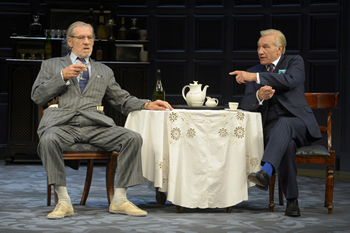
Voids Lost and Found
By Jonathan Kalb
No Man's Land
By Harold Pinter
Waiting for Godot
By Samuel Beckett
Cort Theatre
138 W. 48th St.
Box office: (212) 239-6200
It’s finally happened. Beckett and Pinter have become Broadway commodities—sufficiently so that the British stars Ian McKellen and Patrick Stewart could simply whisper they’d like a go at them and the forces of thespian commerce rushed to organize a repertory run of Waiting for Godot and No Man’s Land, first in the West End and now in NYC. Gone, evidently, are the days of public bafflement and mass walkouts. The masses—those with $137 or so to spend, that is—now line up at the Cort Theatre to test their fears of boredom and obscurity against the allure and talent of these two beloved celebrities (the actors, that is). You’d never know it from the din of people applauding their brilliant expenditure at both shows, but the results are in fact mixed.
Stewart is a first-class Shakespearean actor, but the truth is, he is utterly wrong for Beckett. His voice and bearing are so indelibly patrician that he can’t convincingly inhabit Beckett’s impoverished world. This is not a question of realism: many famous clowns have excelled in Godot without adjusting their comic personas much to impersonate real bums. The comics played themselves and it worked because those personas read as a form of existential desperation. The only vaguely desperate or unapt quality to Stewart is his threadbare costume; all his professed inadequacy is really competence in disguise. Thus, even though McKellen is wonderful as Gogo—hilariously seedy and fascinatingly fidgety—Didi and Gogo's plight of endless waiting wholly lacks danger and insecurity. It’s nothing but a flimsy platform for lame games whose innocuous triviality the audience confirms by crying “awww” after each one ends.
Stewart’s courtly bearing, however, is the ideal spice for Pinter’s No Man’s Land, whose main characters are a haughty aristocratic poet reminiscent of T.S. Eliot (Hirst) and a shabby, lesser-known poet (Spooner) whom Hirst has, for unclear reasons, brought home from a pub. The last major NY revival of this wonderfully mysterious play in 1994 was as imbalanced as the Stewart/McKellen Godot is. It featured a badly miscast Jason Robards embarrassingly outclassed and upstaged by Christopher Plummer. The play came off then as little more than a mildly enigmatic, alcohol-soaked closet drama.
Stewart and McKellen, by contrast, are so perfectly matched in energy, ingenuity and physical and vocal nuance that the play’s many rich layers open up like flowers. Happily, the director Sean Mathias imposes no overarching concept other than removing the bookshelves that Pinter specified for Hirst’s study and replacing them with a splendidly gloomy expanse of elegantly coffered blue wall (design by Stephen Brimson Lewis). Mathias and company placed their faith in the resonance of Pinter’s language and basic situation, which brought all the central ambiguities into startling focus: Hirst and Spooner’s weird clash of stories about the past, for instance (did they even really know one another at Oxford?), their hints about a homosexual tryst playing off other hints about impotence, Spooner's unexplained power struggle with Hirst’s manservants (Billy Crudup and Shuler Hensley, both compelling), and the outlines of a rueful meditation on the value of poetry.
Anyone interested in the resonant slippages of meaning among Pinter's various planes of reality will find this production a rare treat. It’s certainly the one to choose if you must decide between the Beckett and the Pinter.
